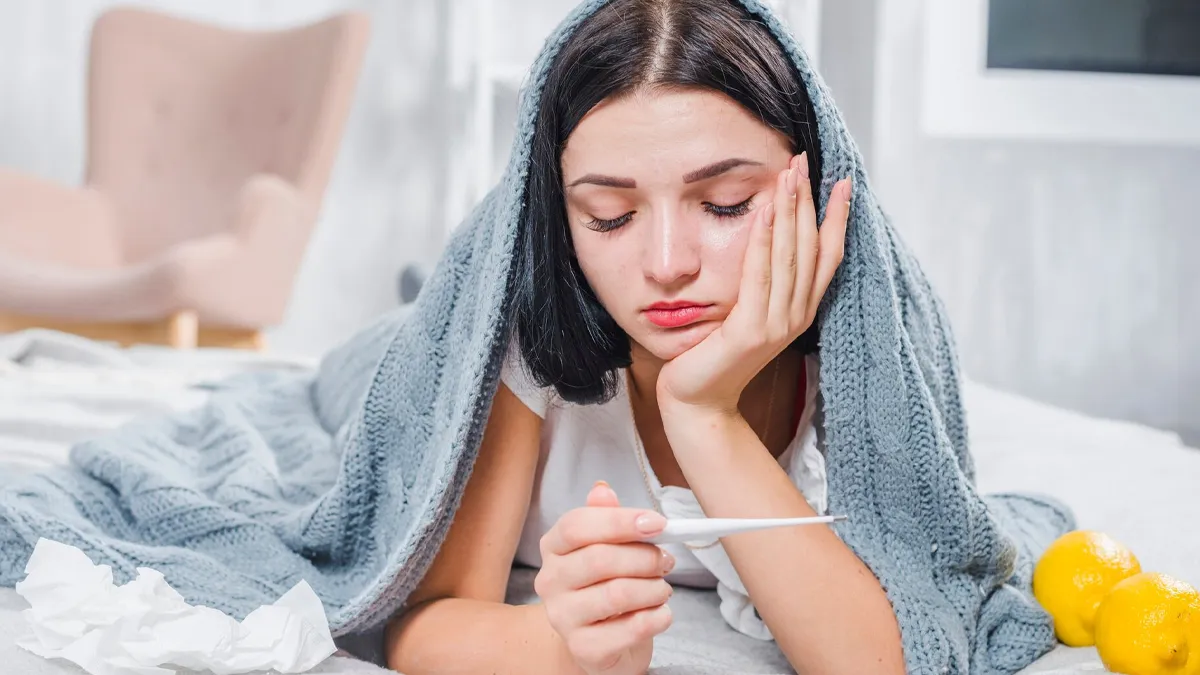
Do you feel feverish during your period? Is this accompanied by symptoms like fatigue, chills and body ache? If you have answered ‘yes’ to all of these, then you must know that you are not alone. Most women experience flu-like symptoms during their period. This even has a name – it’s called period flu.
Table of Content:-
To get a better understanding of what period flu is, we speak to Dr Astha Dayal, Director of Obstetrics and Gynecology, CK Birla Hospital Gurgaon.
What is Period Flu?
Women sometimes experience flu-like symptoms, like low-grade fever, body aches, fatigue, headaches, digestive upset, and chills, before or during their periods. This is referred to as period flu. Though it is not a real viral flu, it can be quite distressing, especially if someone is unaware of its hormonal basis.
“Although period flu is increasingly recognized, it is still under-researched. It is estimated that a significant percentage of menstruating women experience some combination of these symptoms monthly, though severity varies,” says Dr Dayal.
What Causes Period Flu?
The expert explains that the main cause of period flu is hormonal changes during the menstrual cycle, especially the luteal phase, right after ovulation, when estrogen drops and progesterone rises. “These hormonal shifts can affect the immune system and trigger the release of compounds called prostaglandins, leading to inflammation, aches, and sometimes mild fever. Stress, lack of sleep, nutritional deficiencies, and underlying conditions like endometriosis or thyroid disorders may worsen symptoms,” adds Dr Dayal.
How To Treat And Prevent Period Flu
Period flu is a temporary phenomena and not really an infection. Here are some expert-backed home remedies with which you can treat it:
- Using heat packs or warm baths to relieve aches and cramps.
- Taking over-the-counter medicines like paracetamol or ibuprofen for pain and fever.
- Staying hydrated. Water helps ease headaches and reduce fatigue.
- Getting enough rest and sleep, and practicing relaxation techniques such as gentle yoga or deep breathing.
- Eating a nutrient-rich diet including fruits, vegetables, and calcium-rich foods, as a healthy diet can reduce symptom severity.
- Limiting alcohol and caffeine to avoid dehydration and sleep disruption.
“Period flu may not be totally preventable, but its effect may be reduced by following a healthy lifestyle, regular exercise, eating a balanced diet, adequate sleep, stress management, and avoiding smoking can help lessen symptoms gradually. Some supplements like calcium or vitamin B6 may be helpful,” says Dr Dayal.
Does Period Flu Get Worse With Age?
The expert shares that symptoms of period flu may become more noticeable or worsen with age, especially as women approach their 30s and 40s due to natural hormonal changes. This is often seen as part of the broader changes in PMS symptoms in the years leading up to menopause.
Also Read: https://www.onlymyhealth.com/why-feel-sleepy-during-periods-gynaecologist-explains-12977838080
When to See a Doctor
Dr Dayal warns that mild self limiting symptoms can be managed at home, but one must visit a doctor if there are:
- Flu-like symptoms (especially high fever, severe pain, or symptoms outside your usual pattern) are severe or impact daily life.
- Other accompanying symptoms like heavy bleeding, extreme fatigue, or persistent digestive issues.
- Symptoms last longer than one menstrual cycle, occur outside your period, or include respiratory symptoms (cough, sore throat), which may mean a true viral infection or another health issue.
- If the symptoms are interfering with quality of life, then one must visit their gynecologist, as these could be signs of an underlying medical condition.
The Final Word
Women often experience flu-like symptoms such as fever, body aches, fatigue, and chills, before or during their periods. This is referred to as period flu. Though it is not a viral flu, it can be quite distressing. Also, one must visit a doctor if the symptoms worsen.
Also watch this video
FAQ
Is it normal to have flu during periods?
Many people who have periods experience something similar and often call it “period flu.”How long does period flu usually last?
Period flu symptoms can last up to two weeks, but for most people, they start a few days before the period and disappear once it begins.How do you stop the period flu?
To prevent period flu, focus on consistent self-care by staying hydrated, eating a nutritious diet rich in complex carbohydrates and calcium, getting enough sleep, and engaging in regular physical activity.
How we keep this article up to date:
We work with experts and keep a close eye on the latest in health and wellness. Whenever there is a new research or helpful information, we update our articles with accurate and useful advice.
Current Version
Oct 22, 2025 16:05 IST
Published By : Shruti Das